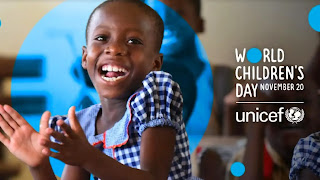For Every Child: Every Right
“If we nurture the dreams of children, the world will be blessed. If we destroy them, the world is doomed!” - Wess Stafford.
Childhood is a crucial stage in human development. Childhood is characterized by rapid physical, emotional, and cognitive growth. During this stage, children develop a range of uniqueness such as curiosity, imagination and playfulness that shape their personalities and prepare them for the challenges of adulthood. Unfortunately, many societies still operate on the outdated and problematic premise that children must be seen and not heard policy. In the aftermath of World War II, the plight of Europe’s children was grave, and a new agency created by the United Nations stepped in to provide food and clothing and health care to these children. In 1953, the United Nations Children’s Fund (UNICEF) became a permanent part of the United Nations (UN). Children’s rights are human rights. Sadly, in too many places today, children’s rights are under attack. In many societies, children are not viewed as humans. As a result of this negative outlook regarding children’s rights many children are subjected to abuse, exploitation and discriminatory practices. It is for this reason that the international community should embrace the observance of World Children’s Day on November 20th. World Children's Day is dedicated to raising awareness about children's rights and improving their welfare.
Theme: For Every Child, Every Right.
World Children’s Day was first established in 1954 as Universal Children's Day and is celebrated on November 20th each year to promote international togetherness, awareness among children worldwide, and improving children's welfare. November 20th is an important date as it is the date in 1959 when the UN General Assembly adopted the Declaration of the Rights of the Child. It is also the date in 1989 when the UN General Assembly adopted the Convention on the Rights of the Child. Every child deserves a long and healthy life and that includes a right to: health, safe, clean and secure environments, education, protection from harm and nutritious food to eat.
What is the Convention on the Rights of the Child?.
The Convention on the Rights of the Child (CRC) is the most universally accepted human rights instrument, ratified by every country in the world except two. The Convention incorporates the full range of human rights: civil, political, economic, social and cultural rights - of children into one single document. The Convention was adopted by the UN General Assembly on 20 November 1989 and entered into force in September 1990. The Convention outlines in 41 articles the human rights to be respected and protected for every child under the age of eighteen years. On January 26, 1990, Jamaica signed the Convention on the Rights of the Child and ratified it on May 14, 1991. Children’s rights are reflected in the Charter of Fundamental Rights and Freedom and the Child Care and Protection Act. Regrettably, although the Convention on the Rights of the Child has been signed by almost every country the concerns of children as well as their unique circumstances are still not taken seriously. Yes, there are many legislative frameworks geared at protecting children. Sadly, many of these mechanisms are under-staffed and under-resourced. Globally, adults have not done their best to protect our children. Unfortunately, many children suffer trauma and abuse and oftentimes the perpetrators are not brought to justice. Statistics from the Jamaica Constabulary Force (JCF) indicate that for the period October 27 to November 6th more than 48 children died under violent and tragic circumstances. Alarmingly, more than 15,000 incidents of child abuse reports were made to the National Children’s Registry in 2022. The nation’s children are not safe.
It is very much evident that there is a disconnect between the commitments that governments make on the international stage and how they go about protecting the children. By prioritizing children's rights and participation, the international community can help to build a better future for all. In the discussions concerning World Children’s Day we must have the involvement of children. As the international community observes World Children’s Day let us be mindful that children rights are human rights. There must also be the realization that there needs to be a collective responsibility in prioritizing children’s rights. World Children’s Day should be observed in a spirit of advocacy and meaningful discourse as it relates to the rights of children. Let us make this world a better place for every child, every right. Happy World Children’s Day.
In the words of Nelson Mandela, let us reach out to the children. Let us do whatever we can to support their fight to rise above their pain and suffering.
Wayne Campbell is an educator and social commentator with an interest in development policies as they affect culture and or gender issues.
waykam@yahoo.com
@WayneCamo
©
#WorldChildrensDay #ForEveryChildEveryRight




Comments
Post a Comment